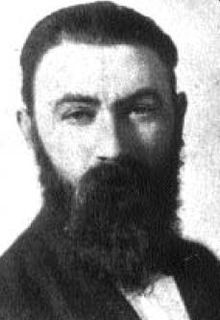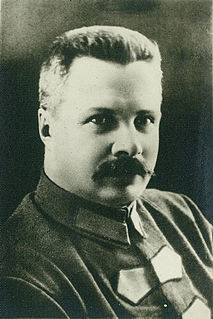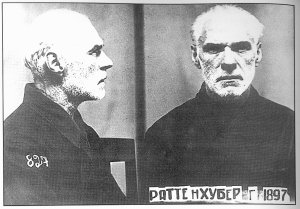 W
WDaniil Leonidovich Andreyev was a Russian writer, poet, and Christian mystic.
 W
WJānis Balodis was an army general, Commander-in-Chief of the Armed Forces of Latvia (1919–1921), Minister of War (1931–1940) and politician who was one of the principal figures during the Latvian War of Independence and the dictatorship of Kārlis Ulmanis, when he officially was the number two of the regime as the Minister of War, Deputy Prime Minister and Vice President.
 W
WLeonid Ivanovich Borodin was a Russian novelist and journalist.
 W
WVladimir Konstantinovich Bukovsky was a Russian-born British human rights activist and writer. From the late 1950s to the mid-1970s, he was a prominent figure in the Soviet dissident movement, well known at home and abroad. He spent a total of twelve years in the psychiatric prison-hospitals, labour camps, and prisons of the Soviet Union.
 W
WMordehai Dubin was a major Jewish spiritual and political leader in Latvia. He served as a Member of Parliament (Saeima) for the Agudas Israel party. He headed the Jewish community in Latvia until 1940, when it was annexed by the USSR.
 W
WMikhail Vasilyevich Frunze was a Bolshevik leader during and just prior to the Russian Revolution of 1917. Born in modern-day Kyrgyzstan, he became active with the Bolsheviks and rose to the rank of a major Red Army commander in the Russian Civil War of 1917–1918. He is best known for defeating Baron Peter von Wrangel in Crimea. The capital of the Kyrghyz SSR was named in his honor from 1926 until 1991, when the Soviet Union was dissolved.
 W
WZoya Alekseyevna Fyodorova was a Russian film star who had an affair with American Navy captain Jackson Tate in 1945 and bore a child, Victoria Fyodorova in January 1946. Having rejected the advances of NKVD police head Lavrentiy Beria, the affair was exposed resulting, initially, in a death sentence later reprieved to work camp imprisonment in Siberia; she was released after eight years. She was murdered in her Moscow apartment in 1981.
 W
WKronid Arkadyevich Lyubarsky was a Russian journalist, dissident, human rights activist and political prisoner.
 W
WAntanas Merkys was the last Prime Minister of independent Lithuania, serving from November 1939 to June 1940. When the Soviet Union presented an ultimatum to Lithuania demanding that it accept a Soviet garrison, President Antanas Smetona fled the country leaving Merkys as acting president. Merkys ostensibly cooperated with the Soviets, and illegally took over the presidency in his own right. After three days, Merkys handed power to Justas Paleckis, who formed the People's Government of Lithuania. When Merkys attempted to flee the country, he was captured and deported to the interior of Russia, where he died in 1955.
 W
WFrancis Gary Powers was an American pilot whose Central Intelligence Agency (CIA) U-2 spy plane was shot down while flying a reconnaissance mission in Soviet Union airspace, causing the 1960 U-2 incident.
 W
WJohann Rattenhuber, also known as Hans Rattenhuber, was a German police and SS general. Rattenhuber was the head of German dictator Adolf Hitler's personal Reichssicherheitsdienst bodyguard from 1933 to 1945. In January 1942, Rattenhuber's RSD units participated in the mass shooting of 227 Jews at Strizhavka. After the war, he was released from Soviet prison on 10 October 1955 and allowed to go to West Germany. He died in Munich in 1957.
 W
WLidia Andreyevna Ruslanova was one of the greatest and best-loved performers of Russian folk songs.
 W
WFerdinand Schörner was a German general and later Field Marshal in the Wehrmacht of Nazi Germany during World War II. He commanded several army groups and was the last Commander-in-chief of the German Army.
 W
WNatan Sharansky is an Israeli politician, human rights activist, and author who, as a refusenik in the Soviet Union during the 1970s and 1980s, spent nine years in Soviet prisons. He served as Chair of the Executive of the Jewish Agency from June 2009 to August 2018. Natan Sharansky currently serves as the Chairman of the Institute of the Study of Global Antisemitism and Policy (ISGAP) (www.isgap.org).
 W
WVasily Vitalyevich Shulgin was a Russian conservative monarchist, politician and member of the White movement.
 W
WBaron Stasys Šilingas was a prominent lawyer and statesman in interwar Lithuania.
 W
WVasily Iosifovich Stalin was the son of Joseph Stalin by his second wife, Nadezhda Alliluyeva. Vasily's mother committed suicide when he was 11 years old, so he was mainly raised by his father. He joined the Air Force when Nazi Germany launched Operation Barbarossa, the invasion of the Soviet Union, in 1941. While he saw limited active service, he managed to rise to the rank of general. After the war he held a few command posts. After Joseph Stalin's death in 1953, Vasily lost his authority, developed a severe alcohol problem, and was ultimately arrested and sentenced to prison. He was later granted clemency, though he spent the remainder of his life between imprisonment and hospitalization until his death in 1962.
 W
WAleksandras Stulginskis [ɐlʲɛkˈsɐ̂ˑndrɐs stʊlʲˈɡʲɪ̂nʲsʲkʲɪs] (listen) was the second President of Lithuania (1920–1926). Stulginskis was also acting President of Lithuania for a few hours later in 1926, following a military coup that was led by his predecessor, President Antanas Smetona, and which had brought down Stulginskis's successor, Kazys Grinius. The coup returned Smetona to office after Stulginskis's brief formal assumption of the Presidency.
 W
WLieutenant General Pavel Anatolyevich Sudoplatov was a member of the intelligence services of the Soviet Union who rose to the rank of lieutenant general. He became involved in several famous episodes, including the assassination of Leon Trotsky in 1940, the Soviet espionage program which obtained information about the atomic bomb from the Manhattan Project, and Operation Scherhorn, a Soviet deception operation against the Germans in 1944. His autobiography, Special Tasks, published in 1994, made him well known outside the USSR, and provided a detailed look at Soviet intelligence and Soviet internal politics during his years at the top.
 W
WJuozas Urbšys was a prominent interwar Lithuanian diplomat, the last head of foreign affairs in independent interwar Lithuania, and a translator. He served in the military between 1916 and 1922, afterwards joining the Lithuanian Ministry of Foreign Affairs. In 1938 Urbšys was named its head and served in this position until Lithuania's occupation in 1940. Urbšys was imprisoned by the Soviet authorities in 1940 and deported to Siberia, where he spent the next 13 years in various prisons. Urbšys died in 1991, having lived long enough to see Lithuania's independence restored, and was buried in Petrašiūnai Cemetery, Kaunas.
 W
WSerhiy Yefremov was a Ukrainian literary journalist, historian, critic, political activist, statesman, and academician. He was a member of the Ukrainian Academy of Science (1919) and Shevchenko Scientific Society in Lviv. Yefremov is his literary pseudonym; his real name is Okhrimenko.